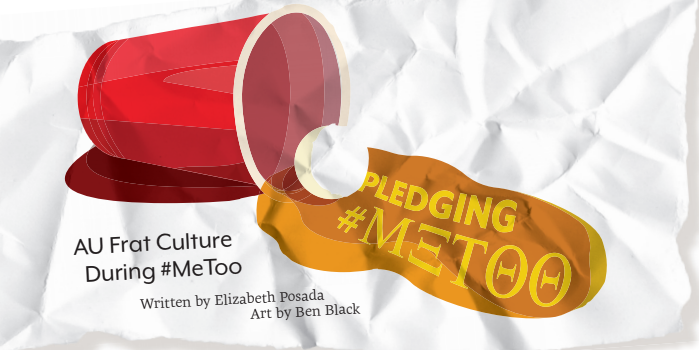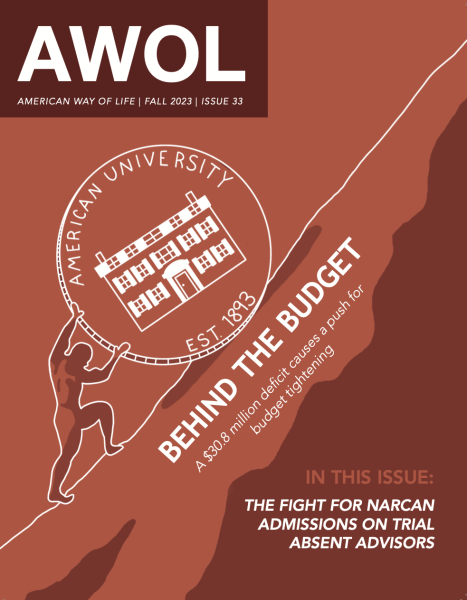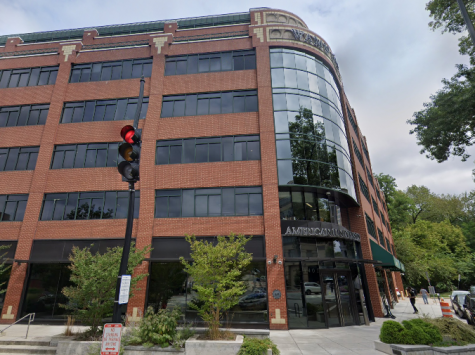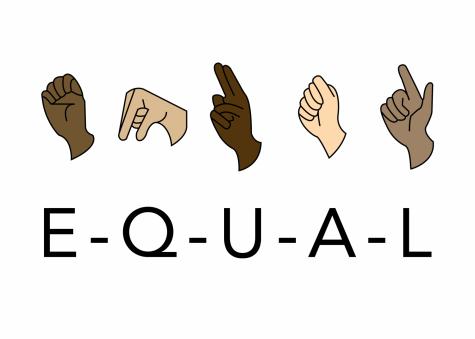Pledging #MeToo: AU Frat Culture During #MeToo
The #MeToo era brings more conversation about the culture of sexual assault in fraternities
This story first appeared in the Fall 2019 print edition of AWOL.
Greek life has been a staple of American culture for decades. Starting in 1776 with Phi Beta Kappa, fraternities began as groups of students who would meet at a set location and have intellectual debates about politics, philosophy, and literature. By the 1920s party culture became an integral part of fraternity life.
Along with party culture, fraternities have become associated with sexual assault. Students nationwide have created various nicknames and phrases for different fraternities such as “Sexual Assault Expected” for Sigma Alpha Epsilon and “Pike Spikes” for Pi Kappa Alpha.
The association goes beyond just culture. Fraternity brothers are three times more likely to perform sexual assault than college men who are not associated with Greek Life, according to a 2007 study published in the Journal of Student Affairs Research and Practice.
One major instance of sexual conduct allegations occurred at Swarthmore College in Pennsylvania. In May 2019, the university disbanded the only two fraternities on campus after a series of rape allegations toward Phi Kappa Psi. Before the official reports, sexual assault victims of Phi Kappa Psi anonymously wrote their accounts and sought help from others on a public blog.
Later, documents about the fraternity were leaked online. In the documents, many members talked about their sexual encounters in a bedroom in the house, which they called the “Rape Attic.” Following the scandal, Swarthmore banned Phi Kappa Psi.
Delta Upsilon, the other on-campus fraternity, decided to disband after the scandal. The organization said in a statement that disbanding was “in the best interest of the Swarthmore community.”
The events at Swarthmore were part of a larger culture of sexual misconduct against women opposed by the #MeToo movement that began in 2017. Women revealed their own stories of sexual assault through social media and brought international attention to the issue. Many institutions came under fire for their inaction toward issues of sexual misconduct.
Fraternities are among these institutions. In universities across the nation, student-led groups have called out fraternities for sexual misconduct. Tensions arose at the University of Pennsylvania after an invitation from an underground fraternity containing a suggestive piece of poetry circulated around campus. Following the email, several students expressed their outrage by posting posters around campus containing the poem from the original email with “this is what rape culture looks like” written over it.
At American University, sexual assault cases linked to fraternites have been taken more seriously by the administration since the exposure of Epsilon Iota, a fraternity removed from campus by the university, in 2017.
Founded in 1943 as a part of the Alpha Tau Omega chapter, EI operated at AU for 58 years. In 2001, EI was disestablished for breaking the university code of conduct.
For the next 16 years, EI continued to run underground, recruiting first-years discreetly.
“[The exposure of EI] definitely shocked us to the core and showed us that we, as a community, need to keep our eyes out for anything, even if it’s not in our own community,” said Benjamin Khoshbin, President of AU’s Interfraternity Council.
After EI’s exposure in 2017, AU warned first-years about their violation of the conduct code. Anyone participating in their activities could be expelled, according to the statement found on AU’s Office of Fraternity and Sorority Life web page.
Since the #MeToo movement and the exposure of EI at AU, there has been a larger conversation about sexual assault on campus. All incoming undergraduate students must attend “EmpowerAU,” a university sexual-violence-prevention program.
Within fraternities, there has been an increase in education and awareness work around sexual misconduct.
As of 2016, five fraternities and sororities are facing sanctions for violating the student conduct code, according to information published by Fraternity and Sorority Life. These organizations include Delta Tau Delta, Beta Theta Pi, Chi Omega, Pi Kappa Alpha and Sigma Chi. All of them have been cases of hazing, underage drinking and threatening the health of others.
AU offers awareness programs that stress the importance of consent. This is done through organizations such as the Greek Wellness Coalition, GreekLifeEdu and OASIS.
Following the events of #MeToo, the number of sexual assault reportings at AU increased significantly, according to Regina Curran, AU’s Title IX program officer.
In regards to the cultural shift from the #MeToo movement at AU, fraternities and sororities have taken more of a stand against harassment with more resources, events and speakers to bring awareness to the issue, Curran said.
“Instead of thinking about [sexual assault] as an abstract, problematic thing, I think our students, and I think our whole campus culture have really been able to see it as an actual individual problem that people are experiencing,” she said.
The larger issue of sexual assault is becoming a more prevalent topic in the media, Curran said.
Fraternities became more comfortable with talking about sensitive topics like sexual assault, hazing, and drug use after EI was exposed, Khoshbin said.
Rachel Carignan, a first-year at AU, said the university has challenged her expectations of frat parties.
“At AU, the frat brothers are more aware of the consequences of sexual assault;” Carignan said. “They really respect Title IX and the rule of consent, which isn’t really seen in the media.”
AU currently has 6 pending federal Title IX cases, according to the U.S. Department of Education, Office for Civil Rights. Five of these cases are for incidents of sexual violence, and one is for claims of retaliation.
The office does not say whether investigations relate to fraternity and sorority life or other university affiliated organizations.
At Zeta Psi, consent posters with sayings like “silence does not mean ‘yes’” cover the walls of their house, according to Carignan. Zeta Psi, like other fraternities, also has sober brothers checking the bathrooms and making sure everyone is all right.
Zeta Psi did not return requests for comment.
In 2015, Faith Ferber was a rising senior at American University when she was raped at a sorority party by a fraternity member, according to the Washington Post. Problems arose when the administration made Ferber sign a confidentiality agreement before a hearing could take place.
Fraternities “emphasize openness” with complaints, Khoshbin said. Khoshbin said that he has also made himself a resource for others with complaints within his own fraternity, Alpha Epsilon Pi, and in the community as a whole.
In a 2016 statement regarding Ferber’s investigation, former Vice President of Campus Life Gail Hanson said, “Students, faculty, and staff have contributed substantively to the progress AU has made in addressing sexual misconduct. Our campus community will continue to work together to enhance the university’s efforts and measures of success in this important work.”
Fraternity and Sorority Life did not respond for comment, leaving AU’s success yet to be measured.
Elizabeth Posada is a first-year student studying journalism.












